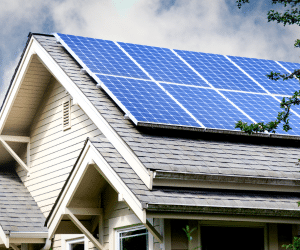Environmental Benefits of Solar Panels: A Renewable Energy Solution
So many Wisconsin homeowners in the Fox Cities and Green Bay areas have started to install solar panels. Solar panels can save on energy costs and also offer numerous environmental benefits as a renewable energy solution.
Here are some of the key advantages:
- Reduction of Greenhouse Gas Emissions: Solar panels generate electricity without burning fossil fuels, which significantly reduces greenhouse gas emissions like carbon dioxide and methane. This helps combat climate change and its associated impacts on the environment.
- Clean and Sustainable Energy Source: Solar power is a renewable and inexhaustible energy source. As long as the sun continues to shine, we can harness its energy without depleting natural resources.
- Air Quality Improvement: Traditional energy sources, such as coal and natural gas power plants, emit harmful pollutants like sulfur dioxide, nitrogen oxides, and particulate matter. Solar panels do not release any air pollutants, leading to improved air quality and reduced instances of respiratory illnesses.
- Water Conservation: Conventional power plants consume vast amounts of water for cooling purposes. In contrast, solar panels require minimal water for maintenance, reducing the strain on water resources and preserving aquatic ecosystems.
- Mitigating Deforestation and Habitat Destruction: Fossil fuel extraction and mining often result in deforestation and habitat destruction. Solar panels, on the other hand, can be installed on rooftops, on marginal lands, or in solar farms without disrupting natural habitats.
- Minimal Noise Pollution: Solar panels operate silently, unlike some traditional power plants or wind turbines that may generate noise pollution, which can have negative impacts on wildlife and nearby communities.
- Low Life-Cycle Emissions: Although there are emissions associated with manufacturing and transportation of solar panels, they have a relatively low carbon footprint over their entire life cycle compared to fossil fuel-based energy sources.
- Distributed Energy Generation: Solar panels can be installed on individual homes and buildings, enabling distributed energy generation. This decentralized approach reduces the need for extensive and energy-loss-prone transmission infrastructure.
- Resilience to Climate Change: By promoting the use of renewable energy like solar power, we reduce our dependence on finite fossil fuel resources, making our energy systems more resilient to the potential impacts of climate change, such as fuel price fluctuations and supply disruptions.




